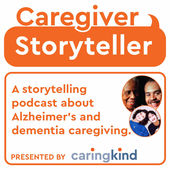The Caregiver’s Voice curated article excerpts looks at the value of relationships among people with dementia, traits of women leaders and caregivers, a new definition of Alzheimer’s, a caregiver storytelling podcast, and a dementia neurologist’s plan for his own cognitive decline.
The Value of Relationships for People with Alzheimer’s Disease and Other Dementias
[7/9/2025 TCV Update: This article URL is not longer available. Instead, we included the URL to WAM] The Women’s Alzheimer’s Movement (WAM) published an excerpt from Finding Joy in Alzheimer’s by Marie Marley, PhD and neurologist Daniel Potts, MD, with a foreword by WAM founder Maria Shriver. “This deep need for relationship does not go away if we develop Alzheimer’s disease or another dementia… For relationships to be maintained we must believe people living with Alzheimer’s or other dementias still retain their personhood.” Maggie’s story illustrates the authors’ point.
Leading Like a Woman
Here is an encouraging reminder to all women leaders [and caregivers]. Over a 38-year career, which includes executive development and succession planning, I’ve had to remind male VPs to include their female team members in planned fun activities offsite. If you’re planning to socialize with the guys, you better involve the gals, too; otherwise, you lose a powerful bonding opportunity with each of the members of your team. Female leaders, according to CEO, Andrea Heuston and author of this article, are more empowering and inclusive. These two traits are essential for caregivers. Take heed of Heuston’s message. Feel strengthened by her three undervalued traits of female leaders [caregivers] and then share.
New Definition of Alzheimer’s?
The National Institute on Aging and the Alzheimer’s Association released a new definition of Alzheimer’s disease based on biomarkers. Top Alzheimer’s specialists discuss the new definition (for research not clinical use) and the issues it raises, including: expensive tests not covered by insurance; what next after telling people they have the biomarkers for Alzheimer’s; advancing research with skyrocketing Alzheimer’s numbers and scaring the public with visions of bankrupting healthcare.
Reflections of a dementia specialist: I want to stop working before I embarrass myself
 I seek “to lay the groundwork for handling a period of gradual mental decline and deterioration in my ability to function professionally. This will probably entail the development of a transitional plan consisting of accommodations, increased support and diminished responsibilities, similar to those adopted by my proactive patient.” Read Dr. Kirk R. Daffner six steps to managing his future self should cognitive decline compromise his work quality. “I remind myself that I don’t want to be that older physician who provides a low standard of care to my patients, embarrasses himself in front of colleagues or sullies the reputation he has built over decades.”
I seek “to lay the groundwork for handling a period of gradual mental decline and deterioration in my ability to function professionally. This will probably entail the development of a transitional plan consisting of accommodations, increased support and diminished responsibilities, similar to those adopted by my proactive patient.” Read Dr. Kirk R. Daffner six steps to managing his future self should cognitive decline compromise his work quality. “I remind myself that I don’t want to be that older physician who provides a low standard of care to my patients, embarrasses himself in front of colleagues or sullies the reputation he has built over decades.”
CaringKind Podcast with Caregivers
 Caregiver/Storyteller is a new storytelling podcast about Alzheimer’s and dementia caregiving produced by CaringKind, the Heart of Alzheimer’s Caregiving. Chris Doucette interviews caregivers – how they became caregivers, the ups and downs of their journey, and how they’ve changed. Through confessional storytelling, listeners hear the first-person account of caregivers. Consider Episode 5 in which Dr. Gomez talks about his father, also a doctor living with Alzheimer’s. His father was taken advantage of in a brazen and shocking manner, ultimately involving the FBI. The stories convey loss; yet, fortitude, loyalty, gratitude, joy, and humor.
Caregiver/Storyteller is a new storytelling podcast about Alzheimer’s and dementia caregiving produced by CaringKind, the Heart of Alzheimer’s Caregiving. Chris Doucette interviews caregivers – how they became caregivers, the ups and downs of their journey, and how they’ve changed. Through confessional storytelling, listeners hear the first-person account of caregivers. Consider Episode 5 in which Dr. Gomez talks about his father, also a doctor living with Alzheimer’s. His father was taken advantage of in a brazen and shocking manner, ultimately involving the FBI. The stories convey loss; yet, fortitude, loyalty, gratitude, joy, and humor.








